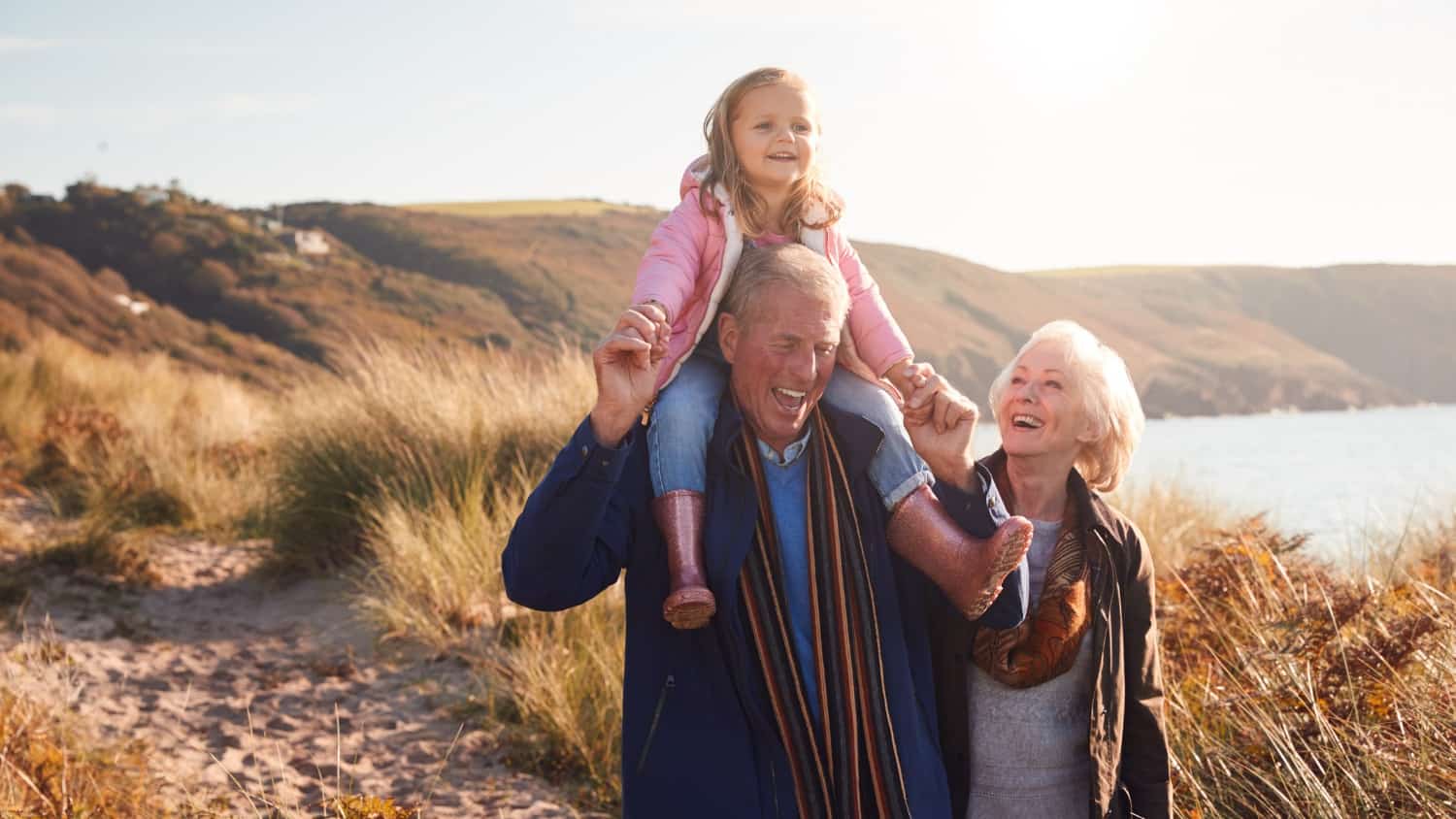
The Best Reason Your Kids Should Become Young Parents
Many of us whose children have entered their 30s are still waiting to become grandparents. We understand that our kids have every right to make their own decisions about when and whether to become parents. If they never want to have children, that’s their business.
Many, however, are happily coupled up and just waiting until they’re “ready” to begin the parental journey. Meanwhile, you may be more than ready to be tagged “Grandma.”
How the Argument Is Framed
I have two school-aged grandchildren, so my empathy for your impatience comes not from the perspective of the yearning grandparent nor even the parent, but from the point of view of the child, because I was the daughter of old people. Does anyone ask the children?
The typical now-vs.-later debate tends to weigh the youthful advantages of higher fertility and greater physical energy against the benefits of completing education and achieving financial stability, which take time. Both sides make convincing points.
The Case for Waiting
Statistically, early pregnancy decreases the mom’s lifelong income. That’s a lot for the woman to give up in both money and professional fulfillment. It impacts the family as well, although I would argue that children need basics but not wealth. Parents are the ones who like to get their career ships on a steady course before taking on additional crew.
Studies also indicate that earlier motherhood correlates with a higher rate of depression. Some people promote government help with childcare, tax relief, higher education and mental health as a means of leveling the playing field for younger families.
Counterpoint: Have Them Now
Delaying parenthood has its own downside. Miscarriages increase with age, and the fertility issue alone is concerning. It’s expensive and a lot of trouble to get pregnant when it’s not happening easily.
According to the American College of Obstetricians and Gynecologists, fertility begins declining by age 30. In their 20s and early 30s, 1 in 4 women will get pregnant in any single menstrual cycle. By age 40, the figure drops to 1 in 10 women.
Starting later also limits options for spacing out the kids’ ages and for having a big family. And we’re always hearing older moms fretting about their bodies bouncing back very slowly, if ever.
No One Asks the Kids
Young dads enjoy playing sports with their kids, while older dads feel they have more wisdom to guide them. Each side of this conversation is valid, even the reasons for delaying parenthood that boil down to “I don’t want to have kids yet,” a simple desire to stretch out a carefree lifestyle as long as possible.
That’s all fair to the moms and dads. But what about the children? The pertinent literature presents the parents’ self-reporting along with empirical data on how the kids turned out. I have not found research surveying the kids, grown or otherwise, about their experiences. So I’ll supply that information right here.
Because my parents met late in life, I was born to a 43-year-old mother and 50-year-old father, and then I was urged to do the opposite. “Have your kids while you’re young, and grow up with them,” my mother repeated to me frequently.
Understandably, my parents were a bit old-school, but they were great parents. I can’t say I suffered by being their daughter. But that worked against me in a way, because I was always so scared of losing them.
You know the way parents check the breathing of their sleeping babies? In our house there was role reversal. If I woke up in the middle of the night, I’d listen at my parents’ bedroom door to make sure I could hear their gentle – and not always that gentle – snoring. If they got sick or just were late arriving home from a movie, I’d turn into a little girl with a big worry.
The One Thing That Hasn’t Changed
Of course, that was then. It was so unusual to have older parents that my dad was often assumed to be my grandfather. Today, there’s no stigma if you’re 10 and your parents are in their 50s. So any feeling I sensed of being different in my youngest years doesn’t apply much to my grandchildren’s generation. But one thing hasn’t changed, and not to be a downer, but that’s death.
From what I can tell, a lot of people expect to live into their 90s. But life expectancy for someone born in the United States when our now 30-something offspring arrived – the 1980s – was about 74 years. By just before the pandemic, it had risen to 78 years.
Despite my anxiety, my parents each lived an average lifespan. Dad was 74, and Mom was 82. The trouble was my own age: only 24 when I lost my first parent. My sweet father missed out on so much of my life, and it still makes me sad.
Being born late in my parents’ lives also cheated me out of grandparents. The two who were living when I was born died when I was 4 and 12. If 38 becomes the preferred age for people to have children in future generations, grandparents will be 76 when that child is born. The honored great-grandparent may soon become a quaint concept of the past.
Inspire Your Adult Children
Parents want to do what’s best for their children. Having some financial resources makes raising kids easier. But giving them young parents who have lots of energy and are likely to remain vivacious as the kids grow and have their own children is also a very nice thing to do for them.
If you’re trying not to nag but want your children to know that you would love to be a grandparent, you can tell them you read about this 68-year-old woman who grew up with older parents and, not enjoying that aspect of her childhood, was always very glad she had her first child at age 26 and grew up with her kids.
Let’s Have a Conversation:
Are you a grandparent? Were you young when you had your kids? Do you think having kids early on is better for the children? What is your experience with having older/younger parents, no/all grandparents? Please share your thoughts below!







I had my first child at 25 and the second at 29. I feel it was a perfect time for me (I was very mature). My children aren’t going to have children at all. My eldest (son) at 41 doesn’t want to bring children into the messed up world we currently live in. My 36 year old daughter just doesn’t want children. They both love kids and are great with them. Of course, I always hoped for grandchildren but also respect and understand their choice. I definitely feel like I’m missing out when everyone I know are becoming grandparents.
My parents married after WW2. I was born when my parents were 43. They died within 6 months of each other when they were 75.
I only had one grandparent still living. My maternal grandmother lived upstairs in our 2 family home.
I only knew one grandparent but it was such a treat having her right upstairs! We would go to Church together and my mom prepped her meals so many times I went upstairs to have my meal with “Nana”. I loved the one on one attention!
My parents, although older, were more settled and wise. They attended my school activities and were always encouraging regarding my academic studies.
I’m happy that my parents were more established emotionally and modeled a way of life that was considerate, respectful and stable.
I believe I learned compassion from spending time with my only grandparent. My career was in health care and I loved spending time with patients and their families.
I think it’s hard to know if young vs older parents has a universal answer. So much depends on other personality components besides chronological age.
First child at 21 and second at 23. My husband was 22 and 24.
I grew up with my children and enjoyed every minute.
Later on we both went on to college.
My husband first and then me.
We were young enough to handle both.
Both of my children waited to have their children. Our son has passed away leaving a 21 and 15 year old. Our daughter has only one.
I’m so sorry about your son, Sharon. Thank you for your comment – that “growing up with your children” has its rewards. We sure had energy back then.
I waited until I was 30 to have my first child. I had taught for 12 years and had my masters degree. I am 67 at this time. I went on to have five wonderful children and was a stay at home mom for 20 years. The thing I liked about being an older mom was that I did not resent my children at all, but cherished them. I had gotten my anger issues and resentment issues out on other peoples children as a teacher! Not exactly anger of course but just frustration? I had gotten to go on a few nice trips and pursue my sewing hobby and work hard at my job and most importantly I worked through my childhood issues and grew up in my 20s. I am blessed to have a wonderful relationship with my children, and they credit my openness and emotional honesty with them as being the best thing in their life. I too have no grandchildren, but my youngest child has just turned 25. I divorced at 52 and being a single mom, I was blessed to be able to have my children live with me while they attended college and got free tuition because I worked for college!! After living with a very overbearing, husband and father, it was a wonderful time of good family relationships for us. My mother was 26 before she started her family and I am the third child of four, so that’s just the way things work out. Fortunately, I did know my grandparents because they lived a long time.
My 25 year old just recently “launched “- actually lives with her next sister/sibling! I now live with my eldest daughter and husband who have chosen a child-free life. It is my first time to have some FREE time to pursue my hobbies and passions since I was in my late 20’s. I am SURE I will adore grandchildren, but I loving this time to rediscover myself!
Thanks for the article. I am very happy for my children to wait until they are ready to have children.
Sybil, it sounds as if your life’s time line worked out very well for you. Today waiting until 30 is considered having children young. It’s really waiting until 40 that concerns me. I do understand all the reasons, but on balance I believe there are better reasons to start a family in your 20s or early 30s, especially if at that point you’ve found someone with whom you’d like to share parenthood. Thank you for your perspective, and best to you as you explore the joys of a (sort of) empty nest!